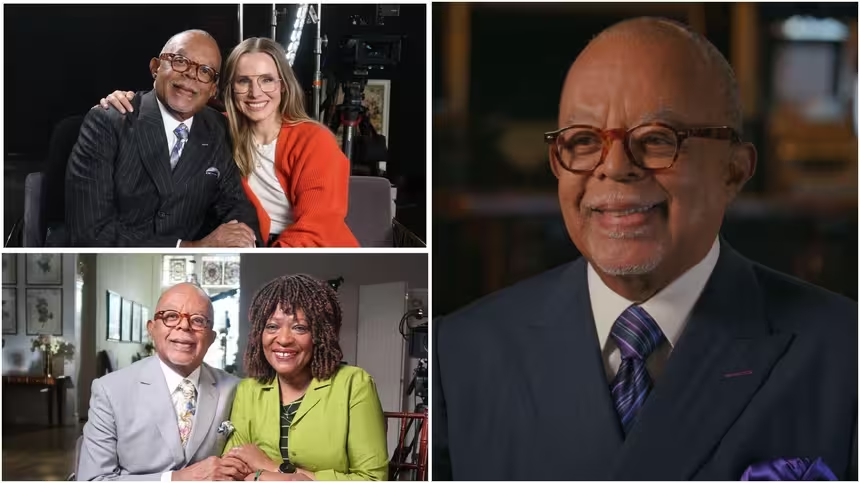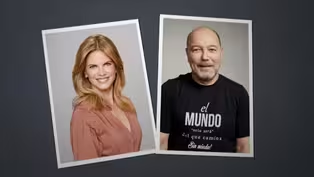Finding Your Roots
Rubén Blades Traces His Panamanian Heritage
Clip: Season 11 Episode 6 | 4m 5sVideo has Closed Captions
Rubén learns about the difficult life of his African ancestor in Panama on his mother's side.
Rubén learns about the difficult life of his African ancestor in Panama on his mother's side.
Problems playing video? | Closed Captioning Feedback
Problems playing video? | Closed Captioning Feedback
Corporate support for Season 11 of FINDING YOUR ROOTS WITH HENRY LOUIS GATES, JR. is provided by Gilead Sciences, Inc., Ancestry® and Johnson & Johnson. Major support is provided by...
Finding Your Roots
Rubén Blades Traces His Panamanian Heritage
Clip: Season 11 Episode 6 | 4m 5sVideo has Closed Captions
Rubén learns about the difficult life of his African ancestor in Panama on his mother's side.
Problems playing video? | Closed Captioning Feedback
How to Watch Finding Your Roots
Finding Your Roots is available to stream on pbs.org and the free PBS App, available on iPhone, Apple TV, Android TV, Android smartphones, Amazon Fire TV, Amazon Fire Tablet, Roku, Samsung Smart TV, and Vizio.
Buy Now

Explore More Finding Your Roots
A new season of Finding Your Roots is premiering January 7th! Stream now past episodes and tune in to PBS on Tuesdays at 8/7 for all-new episodes as renowned scholar Dr. Henry Louis Gates, Jr. guides influential guests into their roots, uncovering deep secrets, hidden identities and lost ancestors.Providing Support for PBS.org
Learn Moreabout PBS online sponsorshipTurning back to Rubén Blades, we focused on a question he'd raised early on in our interview, the possibility that his father might have had some African ancestry.
We hadn't found any evidence for this in Rubén's grandfather Ricardo's roots, but we were able to trace his grandmother Emma back to a man named Ciriaco Correoso.
Ciriaco is Rubén's fourth great-grandfather.
He was born in 1743 in what is now Panama, and was then part of the Spanish Empire.
His baptismal record indicates that his mother was a free woman of color, clear evidence that at least one of Rubén's ancestors was brought to the Americas from Africa.
That's amazing.
That just cements my thought always that Panama, we have a fusion of backgrounds, you know, in this particular case, I had no idea that my background went that far, that we have Blacks in our family, of course!
Right.
It's the Caribbean, it's Panama, it's like, you know, it's a mixture of everything, of course, and I'm glad that I can say that because that's one of the ways that you disperse the notion of racism.
It's like, accept this, the fact that people are people and that they're all part of our lives every day for as long as we can imagine.
Right.
You know, it's really amazing.
While Rubén embraces diversity, his ancestors lived in a very different world.
Colonial Spain had a rigid social order based on race, and within it, Rubén's ancestor was labeled a quadroon, meaning that he was a quarter Black, and this would have major consequences on his life.
In 1778, when he was 35 years old, Ciriaco tried to become what was called a public notary, a lucrative office within the colonial government.
It was not an easy position to get.
Applicants had to petition the King of Spain, a process in which one's place in the racial order mattered tremendously.
Do you think he got the job or not?
I hope he did.
Okay, let's see.
Please turn the page.
Rubén, this record is also in your ancestors' application, it is dated on the 5th of July, 1778, the same year as the record we just saw.
Oh, boy.
Could you please read that translated section?
"In view of this dossier, and according to the compiled laws of the Indies, it is established that mulattos and mestizos cannot be scribes or notaries.
Therefore, given the testimony that Ciriaco Hipólito Correoso is of quadroon color, the disposition of said law precludes him from being a notary public as he requests.
Therefore, in conformity with it, his pretension is despicable."
His pretension is despicable, isn't that cold?
It's super cold.
That is cold!
This is what's despicable is what they're doing to this guy.
To become a public notary, applicants had to present a dossier showing that they did not have any ancestors who were not of pure Spanish descent.
So people with African, Moorish or Jewish heritage were rejected.
And Ciriaco, of course, could not meet this test.
What's it like to see that in black and white?
It's an unfortunate reality that has followed us to this day because I'm sure that there are many, many ways that this type of thing, in spite of our laws, continue to be applied to people just by the way they look.
Absolutely.
And you know that it happens.
Yeah.
The Complex Chapter in Natalie Morales' Family History
Video has Closed Captions
Clip: S11 Ep6 | 3m 59s | Natalie learns about her maternal third great grandfather, Domingos. (3m 59s)
Video has Closed Captions
Preview: S11 Ep6 | 30s | Henry Louis Gates, Jr. meets musician Rubén Blades & journalist Natalie Morales. (30s)
Providing Support for PBS.org
Learn Moreabout PBS online sponsorship

- History
Great Migrations: A People on The Move
Great Migrations explores how a series of Black migrations have shaped America.












Support for PBS provided by:









